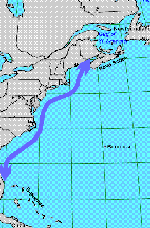 |
 |
 |
 |
 |
 |
 |
Right Whale Migration Update: March 31, 1999
Today's Report Includes:
- Whale Patrol--Any Calves Yet?
- Good News, Bad News?
- Copepod Cafe
- Discussion of CQ #8: Living to a Ripe Old Age?
Whale Patrol--Any Calves Yet?
|
|
Air and sea patrols have been spotting lots of whales, but no mother-calf pairs up this way yet, reports Moira "Mo" Brown of the Center for Coastal Studies. Many of the whales appear to be adult females -- animals that are up here actively feeding rather than giving birth this year. Perhaps if they can stock up on food this spring and summer, we'll have a banner year in right whale calves next winter -- we can only hope!
Good News, Bad News?
Pat Gerrior of the National Marine Fisheries Service's Right Whale Alert Network has informed me that the mother-calf pair sighted off Long Island several weeks ago is apparently one of the pairs observed down south. That's both good and bad news -- good news that they made it up this far north safely, but bad news in that we still have a calf count of only three for the season.
Meanwhile, another four whales have been spotted near the Boston Traffic Lanes just outside the Great South Channel Critical Habitat. This area is usually quite popular with the right whales later in the spring.
Copepod Cafe
 The right
whales are still feeding on copepods in Cape Cod Bay, and one is also staking a claim
on the northwest corner of Stellwagen Bank (it was observed by the first whalewatch
vessel of the season). There has been some surface skim feeding, but most feeding
behavior appears to be subsurface, with the zooplankton concentrated at 4-9 meters
depth, according to work by Dr. Charles "Stormy" Mayo of the Center for
Coastal Studies.
The right
whales are still feeding on copepods in Cape Cod Bay, and one is also staking a claim
on the northwest corner of Stellwagen Bank (it was observed by the first whalewatch
vessel of the season). There has been some surface skim feeding, but most feeding
behavior appears to be subsurface, with the zooplankton concentrated at 4-9 meters
depth, according to work by Dr. Charles "Stormy" Mayo of the Center for
Coastal Studies.Here are the coordinates for the three locations I mentioned:
- 41. 88 N, 70.25 W (Cape Cod Bay),
- 42. 40 N, 70.45 W (Stellwagen Bank), and
- 41. 88 N, 69.60 W (Great South Channel).
Discussion of Challenge Question #8: Living to a Ripe Old Age?
In my last report, I asked "What factors might prevent whales from reaching this ripe old age of 100? And what might be some of the causes of mortality other than old age?"
- The number one known (preventable?) cause of right whale deaths is ship collisions. Impacts can crush skulls and break backbones, and propellers can cut deeply into blubber and flesh. Scientists are working on possible solutions to this problem including uses of sonar and sound for collision-avoidance systems. Sighting networks are attempting to warn shipping when vessels are entering right whale habitats.
- Entanglements in fishing gear and other marine debris also play a role in right whale survival. Lines can block circulation to a flipper or fluke, or can cut into the whale's body so deeply to cause major damage and deadly infections.
- On a local scale, pollution can poison a whale directly, or indirectly by affecting its food. On a more global scale, climate change may shift plankton concentrations to areas that the whales may not be able to locate. Weakened whales, particularly calves, are easier prey for predators like orcas.
One last note: One March 16 a study was published
by the National Academy of Sciences that concluded that: if the current conditions
remain and the population growth rate stays the same, the right whale is doomed to
extinction (with the upper bound set at 191 years). That means, that within 200 years,
there could be no more right whales unless we do something soon to reduce mortalities
(deaths). The authors of this study were Hal Caswell and Masami Fujiwara of the Woods
Hole Oceanographic Institution and Solange Brault of the University of Massachusetts.
Finally here are the lists that two classrooms came up with:
"Right whales might die from ocean pollution. The pollution would kill off the
plankton that they eat which would cause them to starve. Large passing boats might
kill them, smaller boats might hurt them and make it harder to survive. Fishing nets
that are left in the ocean or other pieces of debris might also kill or at least,
harm them. Also, some people still might be hunting them." Rebeccah, Betsy,
Heather, and Ashley- the kids from the fourth grade at Ferrisburgh Central School.
Linda Thurber (lthurfer@pop.k12.vt.us)
"Our class came up with a list of possible reasons why right whales may not
live to be 100 years old (besides old age):
oil spills (polluted water)
stranded on beach
caught in fishing nets
cut by motorboat" From Ms. LaMorte's 3rd Grade Class
(lamorte2@yahoo.com)
That's all for now. No Challenge Questions this week -- I'm looking forward to your
Ask the Expert questions. This is Anne Smrcina, education coordinator of the Stellwagen
Bank National Marine Sanctuary, signing off.
The Next Right Whale Migration Update will Be Posted on April 14, 1999.
Copyright 1999 Journey North. All Rights Reserved. Please send all questions, comments, and suggestions to our feedback form
 |
 |
 |
 |
 |
 |
|

